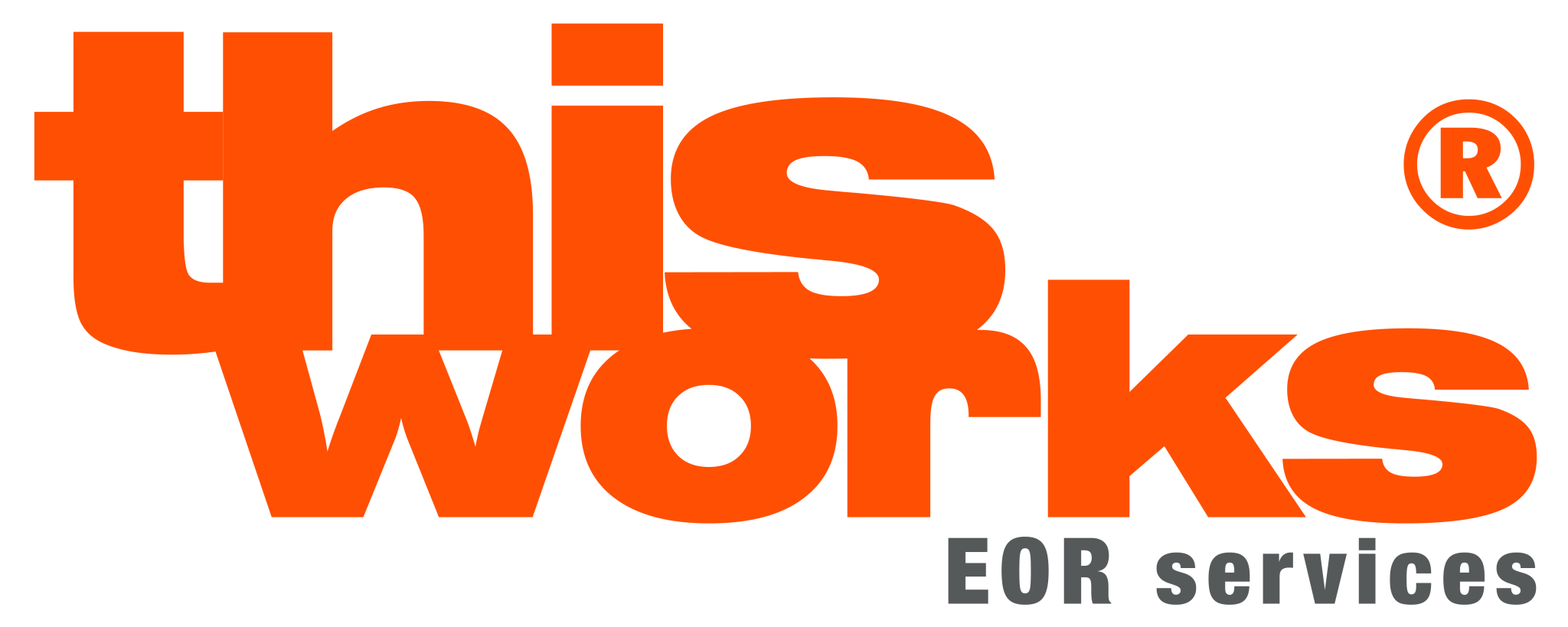
PEO vs. EOR: What is the difference?
Your decision between an EOR and a PEO should align with your company’s specific needs and the challenges of adhering to international laws. EORs serve as the formal employer for your global workforce, streamlining international employment by eliminating the need for local entities. On the other hand, PEOs operate under a model that primarily focuses on connecting companies with potential employees, acting more like a lead generator without assuming shared legal liabilities.
This distinction is crucial as businesses evolve their strategies for onboarding and payroll management. An EOR offers a straightforward solution to navigating the intricacies of taxes and legal regulations abroad by taking on the role of the employer in full. Meanwhile, a PEO facilitates connections between companies and potential hires, without the burden of shared legal responsibilities, but often requires your company to have an established presence in the country of employment.
Often, the way one perceives the difference between EOR and PEO is a personal matter; we aim to explain the distinction from our perspective, while also delving into the original differences.
If you are looking to expand globally and would like more information or a cost estimate, please don’t hesitate to contact our experts. We are here to assist you in taking the first steps.
PEO vs. EOR: Understanding the Differences
PEO stands for Professional Employer Organization. These companies help you outsource elements of the hiring process, especially when expanding into foreign countries. Think of them as assisting you in finding the right solutions – your own HR team still handles core hiring locally. An EOR, or Employer of Record, actually becomes the legal employer of your workers in a foreign country. They’re on the EOR’s payroll, handling all the complexities that come with it. Sometimes, a PEO might help you find EOR providers. EORs often focus on just a few countries where they have deep expertise, becoming specialists in those local laws. PEOs tend to be broader, and able to help you hire across multiple countries. There’s even overlap—sometimes a PEO establishes its own entity in a specific country, allowing it to function as the EOR there.
The key thing to remember is that the EOR is the actual legal employer, so they handle all the liabilities and risks associated with that. A PEO is more like a global navigator, helping you chart your course. The EOR actually handles the nuts and bolts of things like payroll and contracts. PEOs originally focused on streamlining international hiring, while EORs stepped in to take on the direct administrative and legal side of employing workers abroad.
Legal Entity Requirements: One of the main distinctions between PEOs and EORs is the need for a legal presence. PEOs typically require your company to have an existing entity in the country where you wish to hire. EORs offer a workaround – they let you hire globally without the legal hurdles of setting up your own entities. This makes EORs especially attractive if you’re looking to expand quickly into new countries.
Employment Liabilities: PEOs don’t share liabilities, they often act like a lead generator and connect the companies. EORs, on the other hand, fully absorb employment risks as the legal employer. This offers you solid protection against the intricacies of labor laws in foreign countries.
Geographic Flexibility: EORs excel in geographic flexibility, empowering you to tap into amazing talent worldwide. This global reach is ideal for quickly building a diverse and skilled international team, without the time and expense of setting up entities across multiple countries.
Scope of Services: The range of HR services offered by EORs is often broader than those of PEOs, particularly on a global scale. PEOs are strong within established companies, but EORs take this further. They ensure you can confidently navigate the challenges of payroll, taxes, and employment regulations worldwide.
When to Choose EOR and What are the Advantages?
Employer of Record (EOR) services are crucial for companies looking to hire personnel from foreign countries. Unlike Professional Employer Organizations (PEOs), EORs let firms hire abroad without needing to establish local entities. This is a huge deal in PEO vs EOR debates. EORs make it easier to hire globally and follow local work laws. This helps organizations grow into new industries smoothly.
How EORs Help with Hiring Abroad and Growing
EORs make it much easier to hire and grow in other nations. They operate as the formal employer for workers abroad. This implies businesses can avoid the hardest elements of starting up in a new country. With an EOR, you may immediately hire from a huge pool of global talent. This is a huge benefit of employing through an EOR. It shows why EORs are ideal for worldwide hiring.
EORs Handle the Tough Legal Stuff
A key positive of EORs is how they deal with legal matters. Every country has its own rules about work, taxation, and benefits. EORs know these regulations well. They ensure that organizations do everything perfectly, from onboarding to payroll. This protects companies from large fines and legal difficulties. It’s a big reason why EORs are valuable for businesses going global.
EORs Save Money and Time When Entering New Markets
When choosing PEO vs EOR, think about cost and speed. PEOs are helpful but need you to have a company entity in the country. EORs, though, let you hire in new areas without this process. This gives EORs a faster, cheaper option to hire globally. The contrast between PEO and EOR highlights how EORs help companies avoid the huge expenditures and delays of starting up in new regions. This helps firms focus on their main work and enjoy the benefits of a multinational crew without the inconvenience.
When to Choose PEO and What are the Advantages?
Choosing a Professional Employer Organization (PEO) is smart for specific business settings. PEOs are useful when you already have a firm set up in a country. They help with hiring and managing personnel by sharing the tasks. This is a significant point in the PEO vs. EOR discussion. Let’s look into when a PEO is the best pick.
Scenarios Where PEOs Are the Ideal Choice
PEOs are ideal when your firm is growing and you need help with HR duties but want to preserve control. If your company already has a footprint in an area, a PEO can help manage personnel better. They’re also fantastic when you want to offer top-notch perks without the headache of handling it all yourself. This makes picking between PEO and EOR easier for businesses focused on local growth.
Benefits of Partnering with a PEO for Localized Employment Needs
Partnering with a PEO is particularly beneficial for localized employment needs. They handle payroll processing, taxes, and workers compensation. Plus, they can secure better benefits for your workforce because they work with hundreds of organizations and have more bargaining power. This illustrates the PEO services and perks are incredibly helpful for firms who wish to grow locally but need a hand with HR responsibilities.
PEOs in Supporting Existing Entities and Co-Employment Advantages
For businesses having an employment entity already established, PEOs are a great benefit. They step in and share the duty, which is termed co-employment. This implies they help with HR matters while you keep running the show. It’s a win-win since you gain their experience without giving up control. This co-employment model is one of the primary benefits of using a PEO. It displays the difference between PEO and EOR. PEOs support your business by making HR chores easier, while you focus on expanding your firm.

Strategic Considerations for Your Business
When planning your business’s expansion, especially on a worldwide basis, it’s vital to make informed judgments. This entails looking thoroughly at whether to engage with a Professional Employer Organization (PEO) or an Employer of Record (EOR). Each choice affects how you manage your staff, handle taxes, and comply with employment rules. Let’s explore the strategic concerns for your firm in detail.
Assessing Your Company’s Global Footprint and Local Entity Presence
Understanding your company’s global footprint is the first step. This entails assessing where you already have entities and where you might need to expand. If your firm has a large presence in a country, engaging with a PEO might make sense. PEOs are perfect for organizations that have their own entities and require support with payroll processing, benefits, and workers compensation. This assessment assists in choosing between PEO and EOR based on where your organization stands currently and where it intends to be.
Determining the Scale and Structure of Your International Workforce
Think about the size and setup of your workforce across borders. Are you looking at recruiting a few contractors or a huge number of full-time employees? The scale and structure of your multinational workforce will guide you. EORs can be a preferable solution for swiftly hiring in new markets without the burden of establishing businesses. They handle onboarding, and payroll, and assure compliance with local laws, making them ideal for worldwide employment. This phase is critical in comparing HR outsourcing choices between PEO and EOR.
Evaluating Long-term Goals and the Implications of Choosing an EOR or PEO
Examine your business’s future. What are your long-term goals? If you’re trying to establish a permanent presence in a new market, starting with an EOR and then migrating to a PEO as you set up your own organization would work best. This method offers flexibility and scalability. The choice between EOR and PEO has important ramifications for your firm, from how you manage taxes and benefits to your capacity to attract top people. EOR advantages for global employment are evident for organizations wishing to explore new markets without committing to setting up an entity immediately.
Financial Implications of EOR vs. PEO
It’s critical to comprehend the financial implications while choosing between a Professional Employer Organization (PEO) and an Employer of Record (EOR). Each option has a different set of up-front and ongoing costs, and they may have various effects on your company’s profitability. Let’s go into the financial considerations of EOR vs. PEO.
Upfront and Ongoing Costs Associated with Each Model
- PEOs often charge a percentage of your overall payroll or a set cost per employee. This approach can include initial expenditures for establishing the co-employment agreement and continuing costs connected to payroll processing, taxes, workers compensation, and benefits management. The PEO services and benefits can lead to economies of scale for employees’ benefits, thereby cutting prices in some areas.
- EORs, on the other hand, could have greater initial expenses because they take on more responsibility, especially in global hiring settings. They manage onboarding, payroll, taxes, and compliance across several jurisdictions. However, the recurring expenditures might be more predictable since EORs frequently charge a fixed rate per employee, including all services.
Understanding the Impact on Your Business’s Bottom Line
Choosing between a PEO and an EOR can drastically affect your bottom line. A PEO could give cost savings through better benefits rates due to their larger pool of employees. However, if your organization wants global hiring without the complexity of registering local entities, an EOR could deliver more value despite potentially higher costs. The EOR advantages for worldwide employment include facilitating foreign expansion and controlling compliance issues, which can be financially beneficial in the long run.
Potential Savings and Financial Advantages of EOR Services
EOR services offer various financial advantages, especially for organizations trying to expand abroad. By employing an EOR, you save the expenditures involved with creating and managing organizations in new countries. This can lead to significant savings on legal fees, taxes, and administrative expenses. Additionally, EORs can handle employment rules and tax regulations more effectively, decreasing the chance of costly compliance blunders. The benefits of hiring through an EOR also include access to local talent without the financial burden of putting up a physical presence, delivering a simplified and cost-effective approach for global hiring.
| Feature | EOR | PEO |
| Legal Employer | Yes | Shared |
| Responsibilities | Takes on all employment responsibilities | Shares responsibilities with the employer |
| HR Functions | Handles all HR functions | Handles some HR functions |
| Ideal for | Onboarding contractors and temporary employees, global workforce | Onboarding and managing the entire workforce, improving HR operations |
| Legal Entity Required | Not required in hiring global talent | Necessary to hire global talent |
Frequently Asked Questions
1. What is a PEO?
A PEO (Professional Employer Organization) partners with firms to conduct HR functions. This covers payroll processing, collecting taxes, workers compensation, and providing employee benefits. It’s a co-employment model where the PEO shares HR responsibility with the company.
2. What is an EOR?
An EOR (Employer of Record) operates as the legal employer for your employees in regions where your company doesn’t have an employment organization. They handle onboarding, payroll, and band benefits, and assure compliance with local laws, making global hiring easier.
3. What are the major distinctions between PEO and EOR?
The primary contrast between PEO and EOR rests in the employment relationship and legal responsibilities. A PEO shares HR services with your company under co-employment, while an EOR becomes the legal employer, taking on more HR activities and compliance responsibilities, especially advantageous for worldwide hiring.
4. How does a PEO handle compliance?
A PEO ensures compliance by ensuring that payroll, taxes, and workers compensation are handled according to local standards. However, since it’s a co-employment role, your firm also shares the need for legal compliance.
5. What tasks does an EOR handle for a company?
An EOR takes care of onboarding, payroll processing, managing benefits, and ensuring compliance with local employment requirements. They operate as the employment entity for your personnel in new markets, facilitating worldwide hiring.
6. How does the structure differ between PEO and EOR?
The structure difference is significant: a PEO goes into a co-employment arrangement with your firm, sharing HR obligations. An EOR, on the other hand, is the official employer of records, taking all HR and legal responsibilities for your employees in places where you don’t have an entity.
7. What risks are linked with employing a PEO?
Using a PEO comes with the possibility of joint liability. Since it’s a co-employment model, your company remains liable for certain parts of compliance and employment law, alongside the PEO.
8. How does the scale differ between PEO and EOR?
EORs are often better suited for corporations wishing to hire globally without establishing local entities, offering a scalable approach for entering new markets. PEOs are more suited for enterprises with a constant number of employees and existing entities in the countries where they operate.
9. In terms of scope, how does a PEO operate?
A PEO’s scope includes supplying HR services and benefits inside the framework of existing businesses. They focus on local or national compliance and HR management, aiding firms with their domestic workforce.
10. What are the cost differences between PEO and EOR?
Cost disparities between PEO and EOR vary based on the services supplied. EORs could have greater initial costs due to their wide global employment and compliance services, but they can spare corporations from the expenditure of setting up foreign entities. PEOs could have cheaper startup expenses but include recurring payments for their services and benefits. Our experts are happy to assist you with the cost structure. We invite you to get in touch with our specialists and arrange a free consultation.
Article Author – Gino Peters
Gino Peters is the Commercial Director at ThisWorks, with a rich history of nearly a decade in international payroll. Throughout his tenure, he has consistently kept abreast of evolving labor legislation, ensuring that ThisWorks remains at the forefront of industry knowledge. Beyond his vast expertise, Gino is deeply committed to advising and guiding clients and partners with precise insights. His leadership guarantees that all content and operations at ThisWorks meet the highest standards of clarity, accuracy, and compliance.
Follow him on Linkedin
Book a free consultation with Gino Peters





